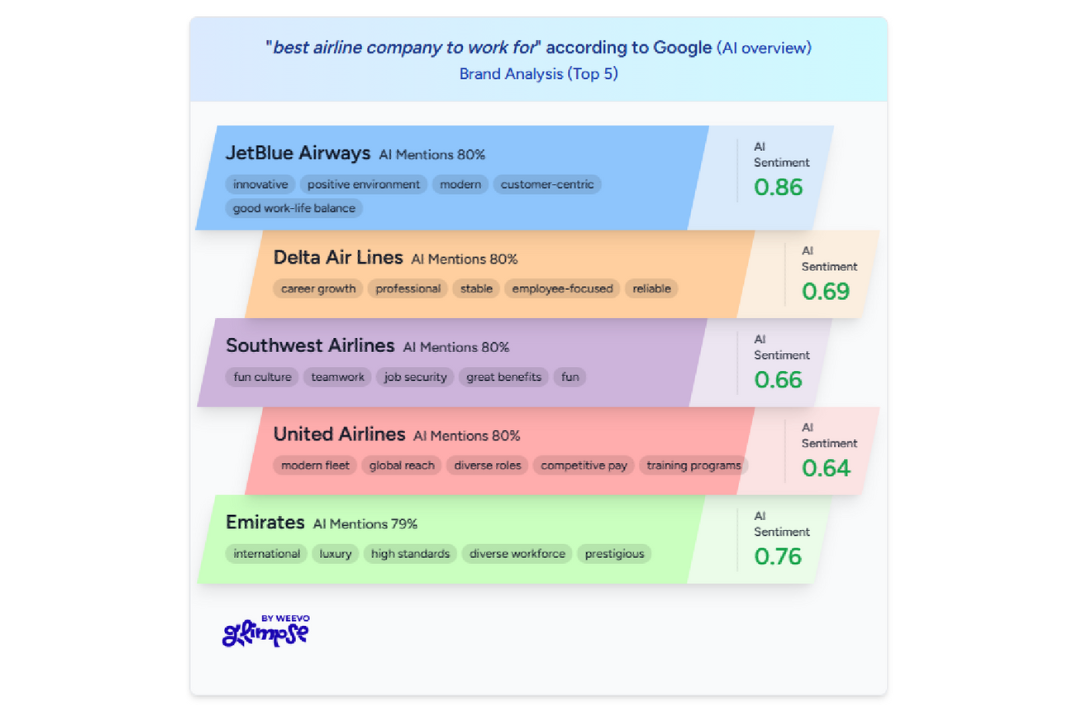Introduction
In the new world of generative search—where users no longer search, but AIs decide what to show—the question is no longer “Which airline is the best?”, but rather:
“How do artificial intelligences portray the airlines?”
To answer that, we conducted two parallel analyses using G.L.I.M.P.S.E. by Weevo, the tool that measures:
-
the frequency of brand mentions in AI-generated answers,
-
the terms associated with each brand,
-
the sentiment behind those descriptions.
Two models, same prompts:
-
ChatGPT 5.1, generating answers autonomously;
-
Google AI Mode (Gemini), queried with the same set of questions.
The outcome? Two almost-parallel worlds, with surprising overlaps… and even more surprising differences.
Why It Matters
As highlighted in previous GLIMPSE analyses—such as the study on European airlines or Italian pasta brands —the issue today is not just appearing in AI outputs, but how the AI decides to talk about you.
Synthetic reputation has become a new form of market positioning:
-
fed by public content,
-
filtered through billions of signals,
-
condensed into a single influential narrative.
The point isn’t only who wins.
The point is who is being told well—and who isn’t being told at all.
The Two Rankings Compared
CHATGPT 5.1 RESULTS
| Brand | AI Frequency | Associated Terms | Sentiment |
|---|---|---|---|
| Delta Air Lines | 95.76% | people-first, employee-focused, best places to work, reliable | 0.90 |
| All Nippon Airways | 95.76% | employee welfare, inclusive culture, modern fleet, safety-first | 0.864 |
| Southwest Airlines | 95.76% | employee-centric, generous benefits, work-life balance, inclusive | 0.80 |
| United Airlines | 95.76% | sustainability, carbon reduction, green initiatives | 0.567 |
| KLM Royal Dutch Airlines | 88.96% | long-standing, inclusive culture, sustainable, supportive | 0.883 |
| KLM (secondary record) | 6.8% | competitive benefits, inclusive environment | 0.878 |
| Alaska Airlines | 0.04% | innovative, sustainable, affordable | 0.875 |
| Garuda Indonesia | 0.04% | modern, reliable | 0.85 |
| SkyWest Airlines | 0.04% | diverse, growing, reliable | 0.45 |
View the research directly on GLIMPSE by Weevo: https://glimpseapp.weevo.it/reports/view/50
GOOGLE AI MODE / GEMINI RESULTS
| Brand | AI Frequency | Associated Terms | Sentiment |
|---|---|---|---|
| JetBlue Airways | 79.76% | innovative, positive environment, customer-centric | 0.859 |
| Delta Air Lines | 79.76% | career growth, stability, employee-focused | 0.688 |
| Southwest Airlines | 79.76% | fun culture, teamwork, generous benefits | 0.66 |
| United Airlines | 79.76% | global reach, competitive pay, diverse opportunities | 0.64 |
| Emirates | 79.36% | luxury, international, premium | 0.756 |
| Singapore Airlines | 78.4% | service excellence, professionalism, training | 0.759 |
| Qatar Airways | 76.88% | award-winning, premium, five-star | 0.835 |
| Alaska Airlines | 72.84% | community-focused, reliable, strong culture | 0.84 |
| American Airlines | 67.08% | large network, unionized, structured | 0.60 |
| KLM Royal Dutch Airlines | 38.08% | sustainability, European heritage | 0.693 |
View the research directly on GLIMPSE by Weevo: https://glimpseapp.weevo.it/reports/view/51
Analysis: When AIs Tell Two Different Stories
1. ChatGPT Rewards Employee Culture. Gemini Rewards Customer Experience.
The narrative of ChatGPT 5.1 is surprisingly inward-looking:
it highlights employee well-being, inclusive culture, career development, benefits, work-life balance.
Delta, ANA, and Southwest dominate because they are framed as excellent places to work from an HR perspective.
Gemini, on the other hand, emphasizes customer service, innovation, luxury experience, global reach.
JetBlue leads not for internal culture but for innovation and customer-centricity.
Two AIs, two value systems:
-
GPT → “What is it like to work here?”
-
Gemini → “What is it like to fly here?”
2. Delta Dominates ChatGPT, but It Loses the Crown on Gemini.
On ChatGPT 5.1, Delta looks almost like a benchmark for employee culture:
-
extremely high sentiment (0.90)
-
described as supportive, transparent, top employer
-
maximum visibility.
On Gemini, it drops significantly: sentiment 0.688, outperformed by JetBlue, Qatar, Alaska, Emirates, Singapore.
Interpretation:
Delta’s synthetic narrative is not consistent across models — a notable reputation risk.
3. Premium Airlines Shine More Clearly in Gemini.
Emirates, Singapore, Qatar…
All appear strong on Google AI Mode, where the “global premium brand” logic is amplified.
In ChatGPT’s rankings, these brands are almost absent or marginal.
Takeaway:
Gemini draws more directly from mainstream media narratives,
while ChatGPT appears to surface a more balanced, HR-driven perspective.
4. Synthetic Invisibility: When a Brand Exists in One Model but Not the Other
The massive differences in frequency (e.g., Alaska at 0.04% on ChatGPT vs 72.84% on Gemini) reveal a critical insight:
A brand may be dominant in one AI model and almost invisible in another.
In a multi-model AI ecosystem, brand reputation may fracture into parallel realities.
What These Numbers Mean
-
AI Frequency
Shows how often a brand appears across AI-generated answers.
The higher it is, the more the algorithm “chooses” the brand. -
Associated Terms
The purest signal of synthetic reputation: what the AI “thinks” when encountering a brand. -
AI Sentiment
A –1 to +1 score that measures how positive and consistent the narrative is.
Even small gaps (0.75 → 0.80) can reflect meaningful narrative differences.
Examples:
-
ChatGPT describes Delta with extremely positive sentiment (0.90).
-
Gemini assigns its highest sentiment to JetBlue and Qatar, not Delta.
Why It Matters / How to Use These Insights
For marketing teams, brand managers, and communication professionals, the ChatGPT–Gemini comparison reveals a crucial truth:
There is no longer a single reputation.
There are multiple reputations—generated by different AIs.
What to do:
-
Monitor narratives across AI models.
-
Identify dangerous inconsistencies (e.g., Delta on GPT vs Gemini).
-
Optimize content for GEO (Generative Engine Optimization).
-
Reinforce desired descriptors (reliable, sustainable, premium, employee-first…).
-
Correct weak signals before they become synthetic invisibility.
-
Benchmark competitors to identify potential positioning gaps.
Try GLIMPSE by Weevo now for free: https://measureairesponses.com/
